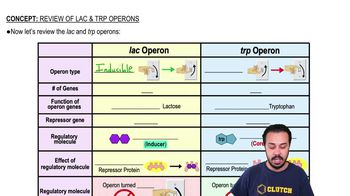Review of the Lac Operon & Trp Operon quiz Flashcards
 Back
BackReview of the Lac Operon & Trp Operon quiz
1/15
Terms in this set (15)
- What is differential gene expression?Differential gene expression is the process that allows multicellular organisms to express genes differently in different cells, leading to different cell types.
- How do liver cells and skin cells differ if they have the same genome?Liver cells and skin cells have the same genome but express different genes, resulting in different proteomes and cell types.
- What is the significance of differential gene expression in eukaryotic multicellular organisms?Differential gene expression allows eukaryotic multicellular organisms to develop various cell types from the same genome.
- What is a proteome?A proteome is the entire set of proteins expressed by a cell, tissue, or organism.
- Why do different cell types have different proteomes?Different cell types have different proteomes because they regulate their genes differently, leading to the expression of different proteins.
- What role does gene regulation play in differential gene expression?Gene regulation controls which genes are expressed in different cells, enabling differential gene expression and the formation of different cell types.
- How does a single eukaryotic cell develop into a multicellular organism with different cell types?A single eukaryotic cell divides and undergoes differential gene expression, leading to the formation of various cell types with different proteomes.
- What is the relationship between a genome and a proteome in a multicellular organism?All cells in a multicellular organism have the same genome, but different cells have different proteomes due to differential gene expression.
- How does differential gene expression contribute to the diversity of cell types in humans?Differential gene expression allows human cells to express different sets of genes, resulting in a variety of cell types with specialized functions.
- What is the importance of gene regulation in eukaryotic cells?Gene regulation is crucial in eukaryotic cells as it enables differential gene expression, leading to the development of different cell types and functions.
- Can you explain how the same DNA can lead to different cell types?The same DNA can lead to different cell types through differential gene expression, where different genes are activated or repressed in different cells.
- What is the outcome of differential gene expression in multicellular organisms?The outcome of differential gene expression is the formation of different cell types, each with a unique proteome, despite having the same DNA.
- Why is differential gene expression essential for multicellular organisms?Differential gene expression is essential for multicellular organisms because it allows for the specialization of cells, enabling complex functions and structures.
- How does gene regulation affect the proteome of a cell?Gene regulation affects the proteome of a cell by controlling which genes are expressed, thereby determining the set of proteins produced.
- What is the role of gene regulation in the development of different cell types?Gene regulation plays a key role in the development of different cell types by enabling differential gene expression, which leads to the production of different proteins in different cells.

